|
|
|
Sort Order |
|
|
|
Items / Page
|
|
|
|
|
|
|
| Srl | Item |
| 1 |
ID:
093895


|
|
|
|
|
| Publication |
2010.
|
| Summary/Abstract |
Israel's general elections in 2009 yielded three major outcomes: 1) the replacement of the bi-polar system that characterized Israeli electoral politics between 1977 and 2003 in which most parties are aligned to one of the two principal parties by a more flexible multi-party system. 2) The nearly total collapse of the Labor party and the Zionist left; for the first time since the 1920s, the Labor party was no longer a major political player, and 3). Kadima's electoral relative success, despite scandals haunting it since 2006. Kadima has basically superseded Labor without necessarily adopting its ideology. We argue (contrary to Henry Kissinger's quip that Israel never had a foreign policy but only a domestic policy) that primarily external factors and processes - chiefly the failure of the Oslo process in the 1990s - yielded these three outcomes.
|
|
|
|
|
|
|
|
|
|
|
|
|
|
|
|
| 2 |
ID:
121109
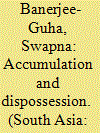

|
|
|
|
|
| Publication |
2013.
|
| Summary/Abstract |
Space and its reconstruction has emerged as one of the foremost devices of capitalist development. In this context, this paper attempts to develop a critique of the prevailing logic of 'development' in India. It argues that the contextual realities of the current exclusionist economic policy in India are defined not only by the nexus of the neo-liberal policy regime and disciplinary political authority, but also by the resistance and struggles of the dispossessed.
|
|
|
|
|
|
|
|
|
|
|
|
|
|
|
|
| 3 |
ID:
118937
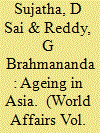

|
|
|
| 4 |
ID:
166882
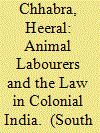

|
|
|
|
|
| Summary/Abstract |
This article is a tentative effort to highlight the symbiotic but systematically underrated position of animals in labour history. It argues for an expansion of human-centric definitions of labour to include non-human animals in this domain. The discussion focuses in later parts on colonial rule in India to examine debates about three colonial legislative enactments dealing with animals as labouring bodies in various capacities. Predictably, this colonial discourse and intervention remains human-centric, too. Yet, closer reading of such historical evidence also indicates exciting scope for developing various aspects of the ‘animal question’ in relation to labour history and South Asian studies.
|
|
|
|
|
|
|
|
|
|
|
|
|
|
|
|
| 5 |
ID:
191708
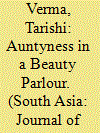

|
|
|
|
|
| Summary/Abstract |
Interactive service work in various middle- and upper-class settings has created visible disparities between those who seek the work and those who provide it. In addition to beauty work, beauty parlours require emotional/affective work, widening the class gap between sellers and consumers by requiring further labour on the part of the worker. However, within the smaller beauty parlours existing in the by-lanes of larger Indian markets, there is the possibility of creating shared space through conversations and care through a mobilisation of ‘auntyness’. In this paper, I explore how the conversations in a New Delhi beauty parlour lead to the creation of aunties that challenges the limits of interactive service work and enables temporary communities of kinship and care that hinge upon the participants’ performances of the styles, affects and values associated with aunties.
|
|
|
|
|
|
|
|
|
|
|
|
|
|
|
|
| 6 |
ID:
027727
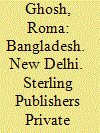

|
|
|
|
|
| Publication |
New Delhi, Sterling Publishers Private Limited, 1985.
|
| Description |
88p.hbk
|
| Series |
Lands and Peoples of the World
|
|
|
|
|
|
|
|
|
|
|
|
Copies: C:1/I:0,R:0,Q:0
Circulation
| Accession# | Call# | Current Location | Status | Policy | Location |
| 027555 | 952.92/GHO 027555 | Main | On Shelf | General | |
|
|
|
|
| 7 |
ID:
176384
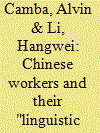

|
|
|
| 8 |
ID:
178756
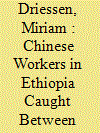

|
|
|
|
|
| Summary/Abstract |
Ever since Beijing has sought to fuel domestic growth through Chinese-led development overseas—first under the aegis of Jiang Zemin’s Going Out Policy and more recently as part of Xi Jinping’s Belt and Road Initiative—thousands of Chinese have moved overseas for work. Africa has been one of the destinations of Chinese companies and their expatriate staff. Although we have learned a great deal about China’s mega-projects across the African continent, little is known about the certified engineers and experienced builders who carry them out. What brings them to Africa? And, more importantly, what makes them stay for years on end, even if they wish to return to China? In this article I zoom in on the lives of Chinese men employed in Ethiopia’s construction industry to show how three decades of domestic growth in China has pushed workers overseas, while jeopardizing their return. Workers’ lives are marked by double displacement. They are not only isolated from local African communities through a dormitory labour regime that controls their time and limits their mobility, but also, more importantly, they are displaced from social life in China. Domestic development has at once increased aspirations and made them harder to obtain, especially for men, who are expected to fulfill the promise of upward social mobility for themselves and their families. In order to realize aspirations and meet social expectations related to social reproduction, geographic mobility has become a necessity for men who cannot rely on family wealth or connections, forcing them into a state of suspension.
|
|
|
|
|
|
|
|
|
|
|
|
|
|
|
|
| 9 |
ID:
180700


|
|
|
|
|
| Summary/Abstract |
Circular labour migration from rural areas has emerged as a key feature of the Indian economy. Generally seen as a positive development, because of its impact of remittances on the household economy of the migrants, circular migration has also been associated with exploitation and unfreedom of the migrant labour. This paper focuses on labour out-migration to the construction sector from one of the economically backward districts of West Bengal, India. Firstly, it examines who participates in this migration process and highlights the nature of such migration. Secondly, it explores the outcomes of labour migration focusing on both the economic as well as the social dimensions. Thirdly, these outcomes are linked with the broader debates on the migration–development linkages. This paper argues that rather than focusing on the short-term and static gains of out-migration, there is a need to investigate the long-term, life-cycle implications of such circular labour migration.
|
|
|
|
|
|
|
|
|
|
|
|
|
|
|
|
| 10 |
ID:
170997
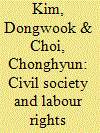

|
|
|
|
|
| Summary/Abstract |
Why do some national governments in Asia and the Pacific protect labour rights better in practice than others? This article argues that labour rights are better protected in Asia-Pacific countries where civil society organizations participate more intensively in the government's policy-making process. It goes beyond treating regime type in the aggregate and demonstrates that the associational dimension of regime type plays a critical role in shaping government protection of labour rights in Asia and the Pacific. Multivariate longitudinal analyses of all 30 Asia-Pacific countries from 1981 to 2011 find robust support for the theory, using new data on civil society participation, and controlling for electoral democracy, trade openness, economic development, unobserved country-level heterogeneity, and other factors.
|
|
|
|
|
|
|
|
|
|
|
|
|
|
|
|
| 11 |
ID:
102748


|
|
|
|
|
| Publication |
2011.
|
| Summary/Abstract |
In May 2010 two elections took place in traditional 'Westminster' polities-the United Kingdom and Trinidad and Tobago-in which coalition governments took power. In both countries, a significant part of the discourse in the run-up to election focused on the inequities of the Westminster model, and, in particular, first-past-the-post. Yet, interestingly, the end result in many ways mirrors the kind of outcome often championed by supporters of more proportional electoral systems. This article compares and contrasts the two different elections, and asks whether such coalitions are set to become a regular feature of a more mature Westminster model.
|
|
|
|
|
|
|
|
|
|
|
|
|
|
|
|
| 12 |
ID:
098238
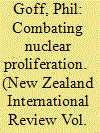

|
|
|
| 13 |
ID:
148282
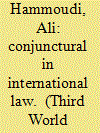

|
|
|
|
|
| Summary/Abstract |
This article will detail an event of revolutionary action in the historiography of anti-colonial and anti-imperial struggle in Iraq, namely al-Wathba (‘the leap’) of 1948, utilising it as an example to address the limitations of the methodology and analysis of Third World Approaches to International Law (TWAIL) scholarship. I will argue that there is a disconnect between notions of agency and structure in TWAIL analyses and that therefore TWAIL scholars should consider studying the conjunctures that allowed certain movements ample room to struggle against the imperialism of international law in the first place. I will use the example of the Wathba to illustrate how a conjunctural analysis may be undertaken, analysing its implications for the international legal order. I will then move to highlight the significance of labour to the conjuncture in question. Finally, I will demonstrate how events like the Wathba illuminate the transient and provisional nature of the foundations of international law, while emphasising its structural constraints.
|
|
|
|
|
|
|
|
|
|
|
|
|
|
|
|
| 14 |
ID:
117167
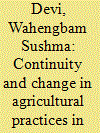

|
|
|
| 15 |
ID:
124728
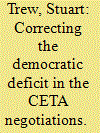

|
|
|
|
|
| Publication |
2013.
|
| Summary/Abstract |
The federal government claims that the Canada-EU Comprehensive Economic and Trade Agreement (CETA) negotiations have been the most transparent and participatory in Canadian history. Labour, environmental, social justice, and other civil society groups that are critical of the proposed agreement for various reasons would argue that their perspectives have been excluded from the official federal dialogue. This article looks at some of the efforts of non-governmental (civil society) actors, and in particular the Trade Justice Network and its member organizations, to affect the CETA negotiations in other ways, with an emphasis on contact with provincial governments, municipalities, European decision makers, and other non-governmental groups in Canada and Europe. It is argued that the exclusion of critical views shows an inherent democratic deficit in the CETA negotiations that privileges corporate insiders at the expense of civil society, the public, and even elected officials. Notwithstanding this deficit, the success of the civil society campaigns can be seen in the problem areas delaying a successful conclusion of negotiations, including new public procurement restrictions for Canadian municipalities and pharmaceutical patent term extensions. For the Trade Justice Network, these areas also help explain how the agreement narrows the fields of economic, environmental, and social governance in Canada.
|
|
|
|
|
|
|
|
|
|
|
|
|
|
|
|
| 16 |
ID:
163865
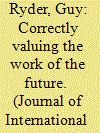

|
|
|
| 17 |
ID:
171048
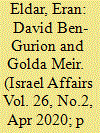

|
|
|
|
|
| Summary/Abstract |
Relations between David Ben-Gurion and Golda Meir were complex and saw many ups and downs over the years. Having enjoyed fruitful collaboration prior to and after Israel’s establishment, with Meir even appointed foreign minister at the height of her career, they were never close friends. The relationship took a steep downhill course in the early 1960s, culminating in Ben-Gurion’s secession from the ruling Mapai party and the establishment of his own rival Rafi party. This article describes and analyzes the complex relationship and the rift between these two central leaders of Mapai and its impact on the party and on the political map.
|
|
|
|
|
|
|
|
|
|
|
|
|
|
|
|
| 18 |
ID:
186850


|
|
|
|
|
| Summary/Abstract |
Departing from the prevailing, individualist perspective of freedom, emphasizing individuals’ independence and the maximization of self-interest via unconstrained decision-making, this article applies the concepts of practised freedom and relational autonomy to explore the lived experience of Chinese rural-to-urban migrant gay men. Drawing on our ethnographic fieldwork in the ‘urban villages’ (城中村) of South China, we examine the ways in which rural migrant gay men achieve a sense of freedom, which is dependent on rural-to-urban migration, informal manufacturing jobs, and other queer peers, thus demonstrating a certain level of relational autonomy. Our article clearly shows how these men have come to identify as homeless guabi (挂逼, local slang for those who suffer a tragic and mysterious fate) and spend their days wandering, with no interest in stable work or long-term monogamous relationships. Our research offers a first-hand anthropological account of young adults from the rural working classes who prefer to ‘lie flat’ (躺平) – they refuse to strive for upward social mobility because they believe that upward social mobility is unattainable and a factory job too taxing.
|
|
|
|
|
|
|
|
|
|
|
|
|
|
|
|
| 19 |
ID:
093899
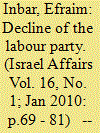

|
|
|
|
|
| Publication |
2010.
|
| Summary/Abstract |
This article presents the main reasons for the gradual decline, and eventually the marginalization, of the Labour Party. It starts with a general discussion of the decline of dominant parties in democratic political systems followed by a review of Labour's decline. Then it proceeds to analyze in detail the reasons for Labour losing its centrality in Israeli politics. The article concludes with a few thoughts about the future of Israeli politics.
|
|
|
|
|
|
|
|
|
|
|
|
|
|
|
|
| 20 |
ID:
092383
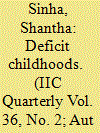

|
|
|
|
|
|
|
|